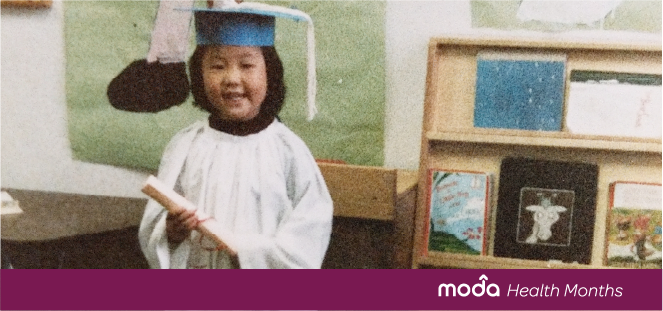Can’t donate blood? There are other ways to give back.

Moda Health’s Min Shepherd was born in Seoul, South Korea. As a child, her family moved a lot. To Arizona, Germany and Italy, then back to the states where they settled down in rural Pennsylvania. As someone who likes to give back to others, it was the time she spent in Europe as a child that still affects her to this day.
One of the ways Min would like to give back is by donating blood. However, the FDA has a restriction that disqualifies her from doing so. To protect the nation’s blood supply from a mad cow disease outbreak in Europe in the 1980s, anyone who lived in Europe for at least six months since 1980 is not eligible to give blood. While the ban has only been around since 2001, it prohibits her from donating to the U.S. blood supply.
“While I’m healthy and would like to donate, that one restriction makes me ineligible to give blood,” she says. “As a result, I’ve had to find other ways I can give back, such as volunteering and donating money. I’ve also gone to blood drives to support friends who are anxious about donating for the first time and shared messages about donation needs through social media.”
The mad cow restriction — which also includes anyone who has lived in the U.K. for at least three months or longer since 1980 — is one of several limitations that prohibit people from giving blood. Other things that can prevent you from donating blood include:
- Medications: There are seven types of medications that, if you are taking them, can disqualify you from giving blood. They include antiplatelet medications, blood thinners, growth hormone injections and multiple sclerosis medication. Click here to see the full list of medications.
- Cold/flu or infections: You cannot give blood if you have a fever, a productive cough, have had an infection within the last two weeks, or are taking antibiotics to treat cold/flu symptoms or an infection. Some infections are transmittable in blood. A general rule is to wait until you feel healthy before giving blood.
- Tattoos and piercings: To prevent transferring the hepatitis virus, if you’ve recently had a tattoo, piercing or any treatment that pierces the skin, you may have to wait at least four months before you are eligible to give blood. Because Oregon tattoos are regulated by the state, this does not automatically put you on a deferral list. If you would like to donate blood, please check with the Red Cross directly about your status.
- Age and weight requirements: You must be at least 16 years old and weigh at least 110 pounds to be eligible to donate blood. Those who are underweight or have low iron can feel faint or weak after giving blood.
- Health conditions: People with serious health conditions are not permitted to give blood. For example, if you’ve had certain types of cancer or are being treated for cancer; have cardiac disease or sever lung disease; have been diagnosed with Hepatitis B, Hepatitis C or HIV; or engage in risky occupations such as prostitution or have been in a relationship with a drug user, you may not be able to donate. For more details, please see the Guidelines on Assessing Donor Suitability for Blood Donation.
- Temporary risks: There are also certain conditions that can temporarily prevent someone from giving blood. They include pregnancy, ongoing fever, surgery and recent alcohol intake.
For its efforts in blood collections over the years, Moda Health has been recognized by the American Red Cross as a Premier Blood Partner. Carrie Townsend, who helps coordinate multiple blood drives per year for Moda, said whether you donate blood or not, every role is important to helping make your community stronger and healthier.
“Supporting a blood drive can be just as important as donating blood,” she said. “Just as you’d be there for a person in an emergency situation to hold their hand or offer words of love and kindness, the support you can provide at a blood drive is just as valuable.”
Other ways you can help
If you’re unable to give blood either temporarily or permanently, there are a number of ways you can help, including:
- Help organize a blood drive: The first step to getting people to donate is to pitch the idea to your colleagues. If everyone’s on board, working with the American Red Cross or your local donor center to organize a blood drive at your office, church or other group can provide an opportunity for people to make a difference in your community.
- Spread the word: If you know about an upcoming blood drive, spreading the word via social media such as Facebook or Twitter can help raise awareness about the drive and encourage more people to donate.
- Support a donor: Going with someone who is giving blood for the first time can provide the support they need to become a regular donor. If you know someone who wants to give blood but can’t seem to find the time, offer to give them a ride or watch their children while they donate.
- Become a volunteer: Local donor centers appreciate volunteers willing to help with blood drives. Volunteer opportunities may include reminding donors by phone or email about their appointment, escorting them when they arrive and making sure refreshments are available for donors. Contact your local blood donation center for more details.
- Charitable donations: Any financial donation you make to the American Red Cross helps people affected by disasters such as wildfires, earthquakes, hurricanes and floods rebuild their lives.
To help ensure communities have blood when they need it, Townsend said everyone can make a difference in the lives of others.
“We all hope the blood is there if we need it,” she said. “Whether giving whole blood that will be used in the ER or surgery rooms, donating blood that is processed for plasma to grow skin for burn victims, or holding the hand of a first-time donor, everything you do makes you a hero. It all helps.”
Moda Health Months: Our personal health stories
To read more personal health stories, please visit our Moda Health Community page.

Hello.
We have exciting news to share. ODS is changing its name to Moda Health.
Moda comes from the latin term "modus" and means "a way". We picked it because that's what we are here to do: help our communities find a way to better health.
Together, we can be more, be better.
Please select the state you live in, or the state where your employer is headquartered, so we can tailor your experience:

Hello.
Please select the state you live in, or the state where your employer is headquartered, so we can tailor your experience:
Privacy notice
We use cookies and similar analytics technologies to understand how visitors interact with our website, improve performance, and enhance user experience. These tools help us analyze traffic patterns and usage trends.
We do not collect or store personal information, track users for advertising purposes, or use social media plugins.
By continuing to use this site, you acknowledge our use of cookies for analytics purposes only. For more information, please refer to our Privacy Policy.
Changing your location to Oregon
You can return to your previous location in the site header.
